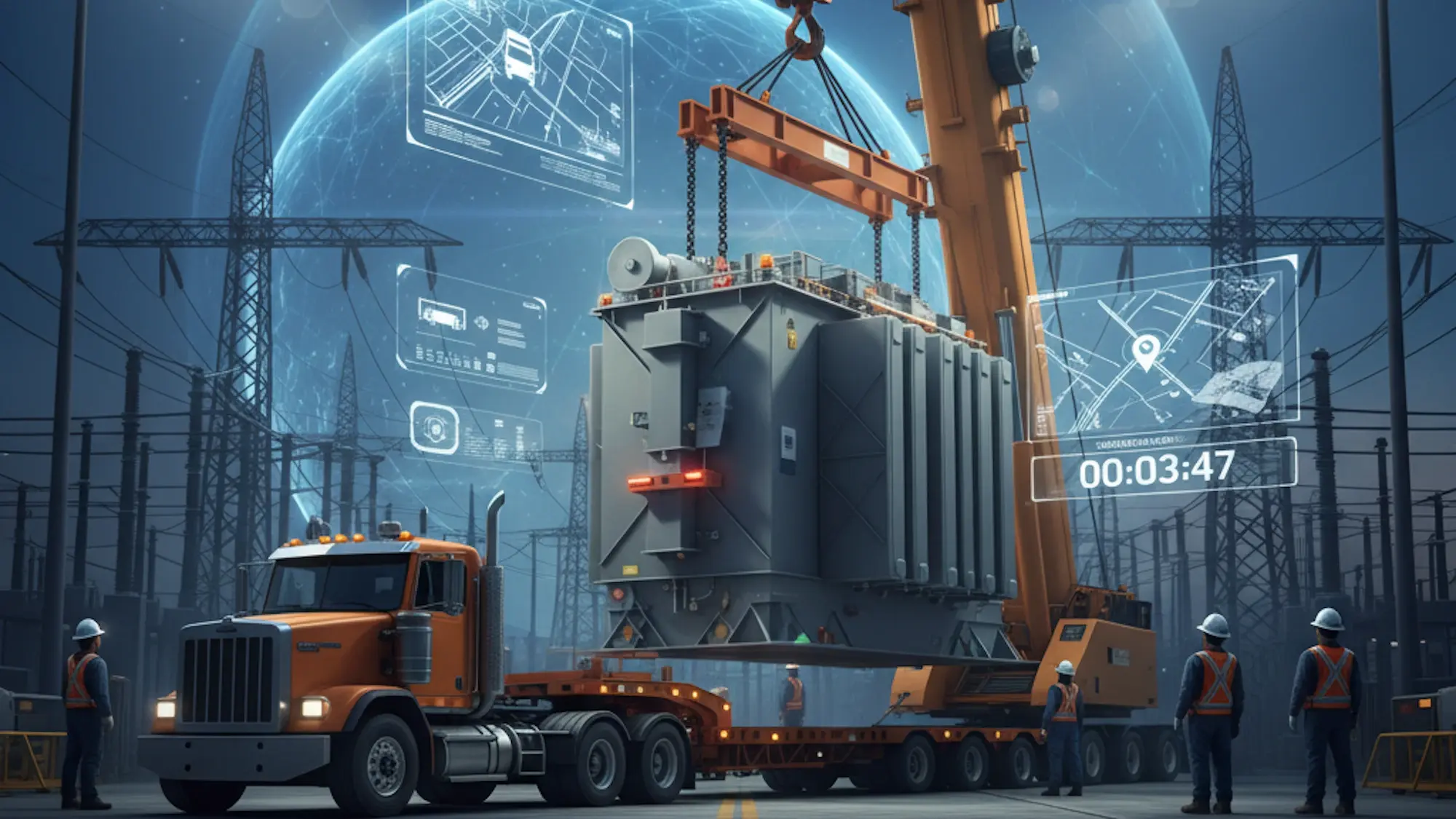
What is the Real Cost of One Hour of Downtime?
When a utility plant, major manufacturing facility, or critical piece of infrastructure shuts down for scheduled maintenance, every minute is not just costly—it's budgeted and planned for. These fixed, non-negotiable windows, often called "Turnarounds," are a race against the clock where an entire project schedule hinges on thousands of moving pieces coming together perfectly. But what happens when a vital component is delayed by just a few hours? You didn't plan for that.
You've just incurred the "Turnaround Tax."
This is the unexpected logistics failure that quickly escalates the total project expense. In high-stakes sectors, this tax is brutal. A global survey commissioned by ABB found that unplanned outages,
Cost the typical industrial business close to $125,000 per hour on average, with losses quickly escalating into the millions across sectors like automotive, energy, and oil & gas, where costs can top $2 million per hour.
The logistics for these projects—known as Turnaround Logistics—is not a simple delivery; it is a critical piece. The question isn't whether you need logistics; it's:
Can you trust your logistics partner to be as reliable as your own internal engineering team?
This blog will explore the specific reasons that move specialized logistics from a one-off transaction to a source of trust and certainty in your most important scheduled maintenance projects.
The Challenge: Reducing the Reliability Risks
The basic fear for any project manager overseeing a major scheduled maintenance event is how reliable every single moving piece will be. Your in-house team plans every detail of the technical work, but the execution of that plan depends completely on an external factor: the delivery of specialized freight—often oversized, very fragile, or required for a single, high-stakes moment.
How can a third party guarantee delivery when external issues—such as weather, road closures, and inspections—can cause problems?
The answer lies not in good luck, but in a detailed, repeatable process. In a critical infrastructure turnaround, a logistics partner has to prove that their approach aligns perfectly with your non-negotiable timelines.
Reliability is a Process, Not a Promise
A typical delivery has a wide window; a scheduled maintenance delivery has a specific time slot. Compare a standard shipment of construction material with the "just-in-time" delivery of a custom-made generator housing or a critical turbine blade. A one-day delay on these can quickly turn into a week of project overruns, damaging their reputation and causing expensive losses. This is why a logistics service can't be seen as just another line item on your spreadsheet, but must be treated as a high-value risk mitigation tool.
The most effective specialized freight management is built on three reliable processes that eliminate risk.
Process 1: Planning Ahead for Smooth Operations
To have a successful scheduled maintenance, you have to start planning the logistics weeks, sometimes months, before the first truck even loads. The goal is to guarantee success before you start moving anything.
1. Pre-Book Your Resources: Securing the Capacity
For critical infrastructure projects, your equipment isn’t standard. You'll need:
- Specialized Heavy-Haul Trucks: For oversized or overweight components that are heavier than standard highway limits.
- Climate-Controlled Trailers: For sensitive parts (like electronics or specialized seals) that require a specific temperature and humidity.
- Special Rigging and Lifting Equipment: Cranes or specialized forklifts with specific weight capacities for job site use.
A good partner plans ahead, booking equipment months in advance to ensure it's available when needed, no matter what else is happening in the market.
2. Proactive Permit and Route Planning
Oversized loads require state and federal permits, which can take weeks to process. Any delay in getting those permits can stop movement for days. The right partner will handle:
- Permit Clearance: Securing all necessary permits well in advance, even for secondary or backup routes.
- Route Surveying: Physically looking at planned and backup routes to identify low bridges, sharp turns, or construction zones that could be a factor in moving the heavy haul.
This stops problems like unexpected road closures, causing permit violations or expensive delays.
3. The Ironclad Backup: Contingency Planning
What if a driver or equipment is delayed or breaks down? A strong plan needs a ready-to-use backup. This means having extra drivers, pre-approved swap points, and repair services along the way.
This level of process assurance is the only way to truly eliminate any points of failure in the chain, ensuring the project's uptime is protected.
Process 2: Precision Delivery: Getting it Off the Truck
The most intense point of risk in turnaround logistics is often the last part: the final-mile coordination at the destination. Getting the equipment to the city is one thing; getting it safely off the truck and to the right place in a functioning or temporarily shut-down plant is a different game.
A. A Specific Time-Slot, Not Just "Delivery Window"
A warehouse can handle a large receiving window. A scheduled maintenance site can't. A component arriving too early can interfere with complex job-site logistics, blocking access for other essential workers and equipment. If it arrives, even an hour late, it can stop a critical installation process that relies on multiple, expensive crews (riggers, welders, engineers) and the pre-booked operation of a crane.
The right logistics partner coordinates time-slot specific delivery—meaning the truck arrives at the exact time required to sync with the site's installation schedule, ensuring optimal workflow and maximum efficiency for your teams.
B. Handling Special Deliveries and Safety
Many critical infrastructure sites, whether it’s a remote power substation or a busy construction site, don’t have standard receiving docks. The delivery process often requires:
- Coordinated Offloading: Pre-arranging for the required offloading equipment (e.g., a 100-ton crane) to be ready and waiting at the right moment with certified operators.
- Last-Mile Logistics: Moving the component across the site itself, navigating tight spaces, uneven terrain, and high-traffic areas.
Most importantly, this has to be done while sticking to the detailed safety protocols. The logistics crew effectively becomes an extension of the site crew, needing specific PPE, site induction, and operational rules. This is a level of integration that not a lot of typical freight providers can offer.
Process 3: Active Monitoring and Proactive Communication
When it comes to scheduled maintenance, information is your most useful asset. Once an important component is moving, your project manager needs to know its exact status 24 hours a day.
24/7 Monitoring and Real-Time Visibility
A system built for project uptime requires continuous, dedicated monitoring. This isn't just about an occasional GPS check; it's about a logistics team that is always watching and ready to jump in as needed. This oversight is important for critical components that are traveling non-stop across multiple states to meet a deadline.
Proactive Communication is the Difference Maker
The goal is not to report a problem; it's to prevent a crisis. If a delay occurs—due to traffic, a sudden weather event, or a border crossing issue—a reliable logistics partner reaches out immediately.
The project manager needs to be told that there's a potential delay before the part is even missed on-site. This way, internal teams can adjust schedules, re-allocate workers, or put their own backup plans in motion, trying to make the delay's impact less severe. This constant flow of real-time visibility and candid communication builds the most valuable asset in any partnership: trust.
From Transaction to Process Partner
Ensuring projects run without interruption during scheduled maintenance and turnarounds is a huge challenge. Using a regular freight broker for specialized freight management is too risky.
At Customodal, we understand that logistics for critical infrastructure is not about moving parts; it's about delivering certainty. Our entire process is designed to deliver the certainty that your project demands, from getting permits months out to delivering a component with time-slot-specific delivery at a complex job site.
We manage all the complex parts of turnaround logistics—the applying resources in advance, coordinating the final-mile and offering you 24/7 monitoring. This way, your in-house team can focus on their core mission: getting the facility back online on schedule and under budget.
When the stakes are high, you need a partner whose processes are designed to deliver maximum uptime. You need a partner built for certainty. You need Customodal.




